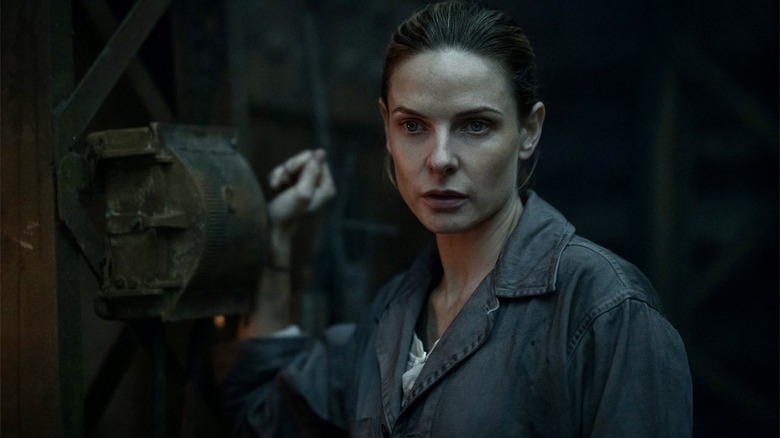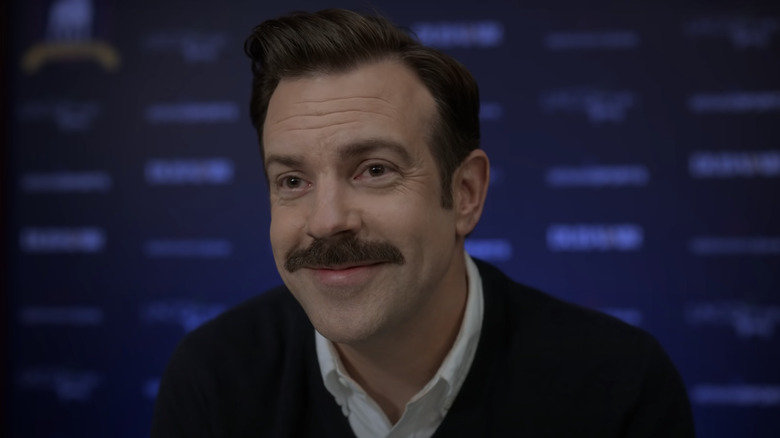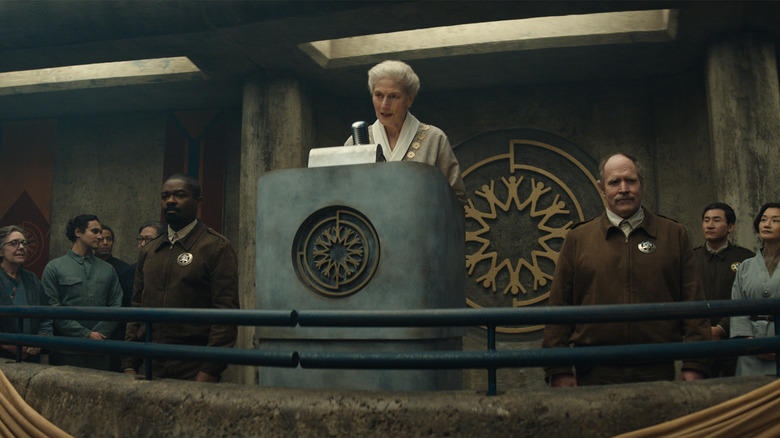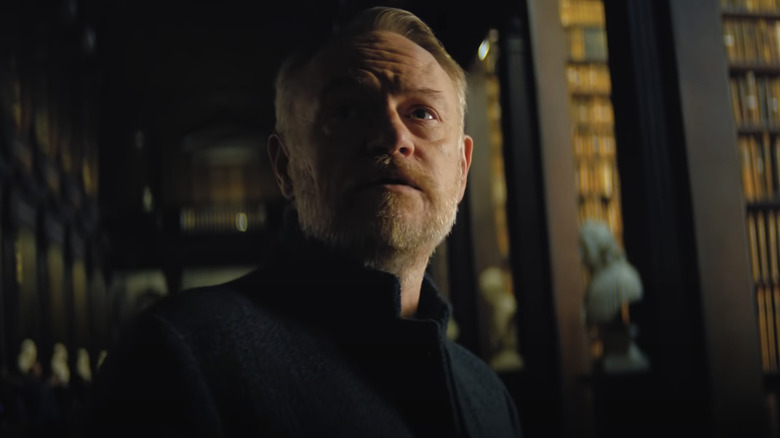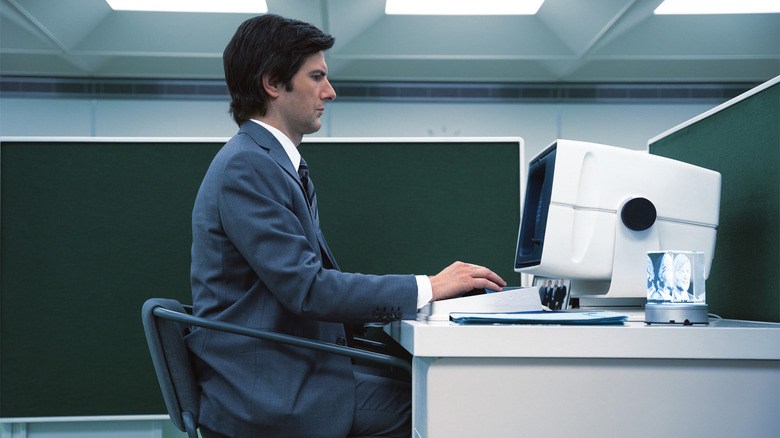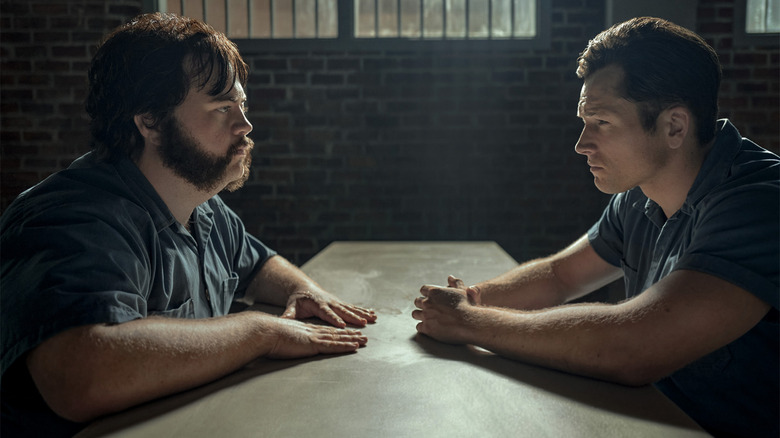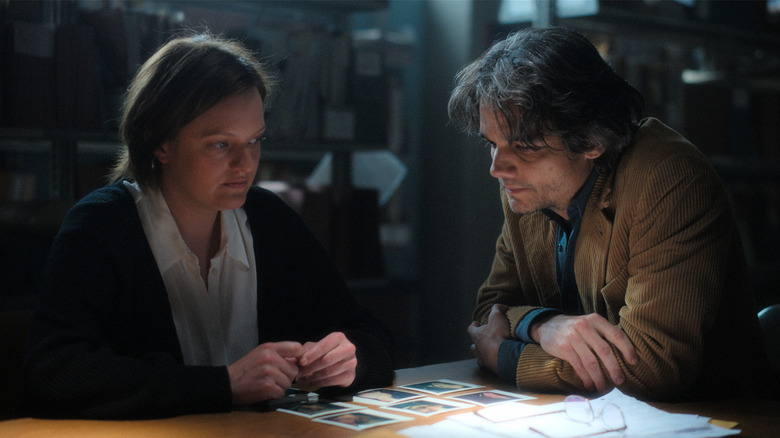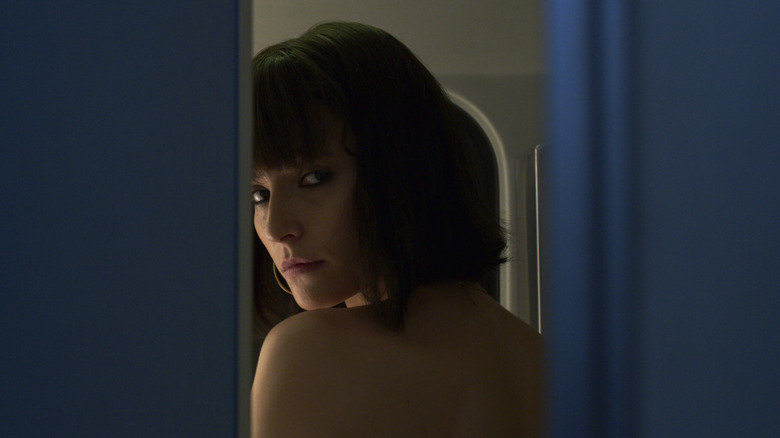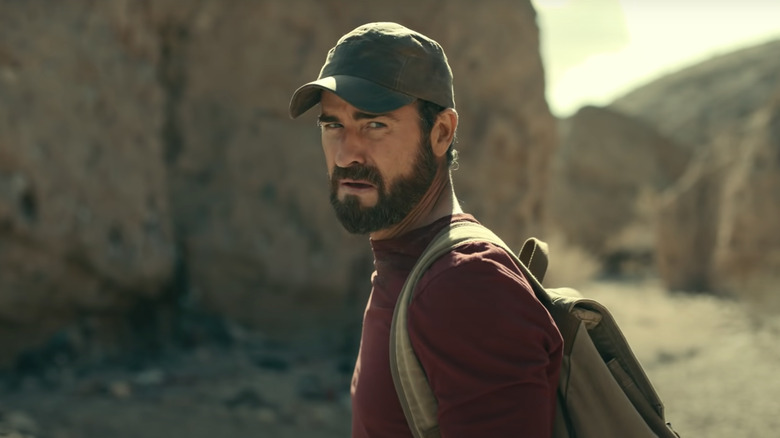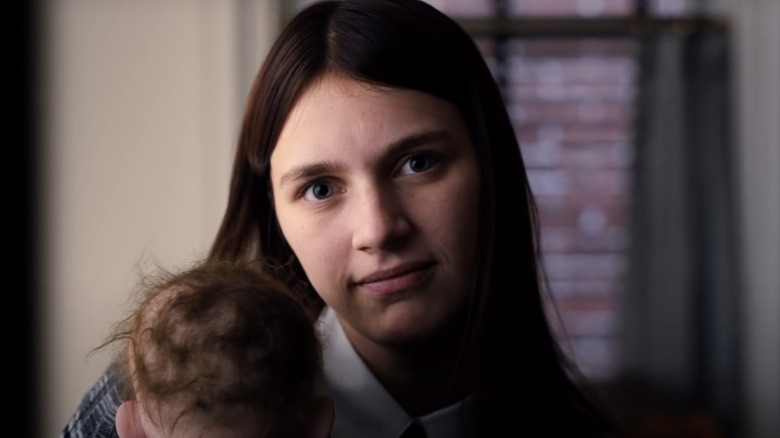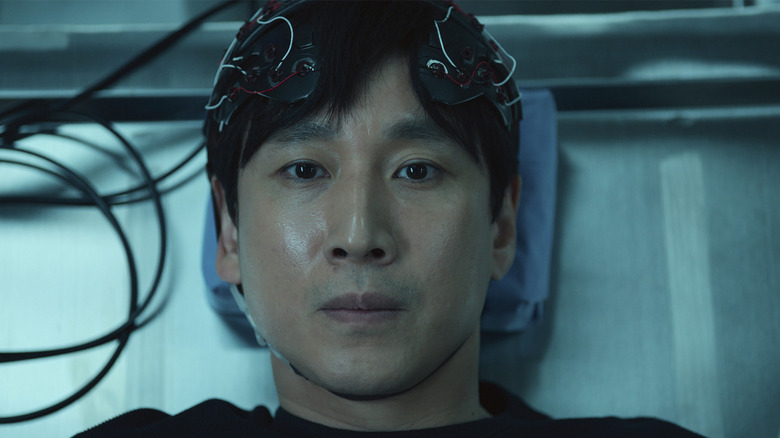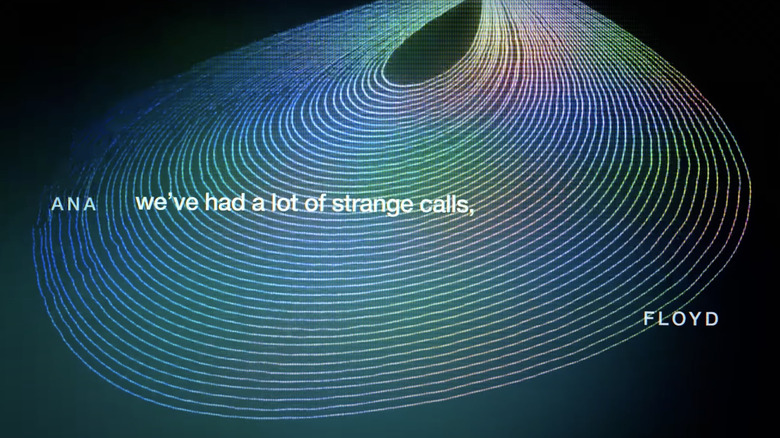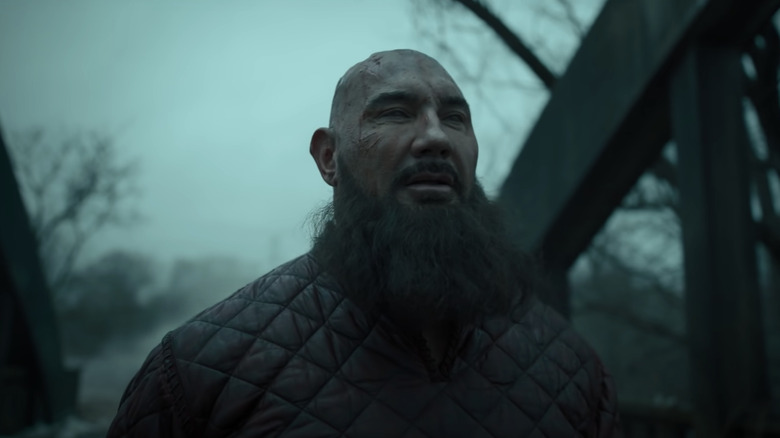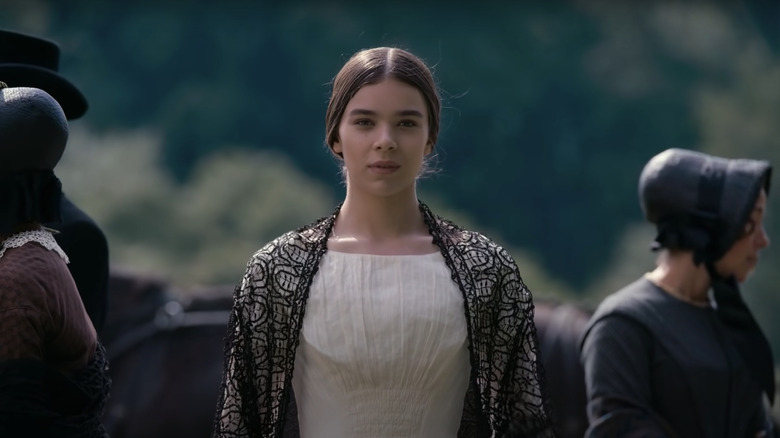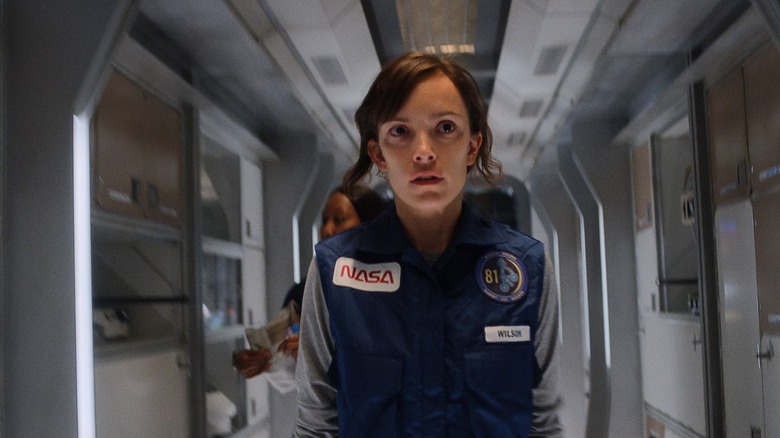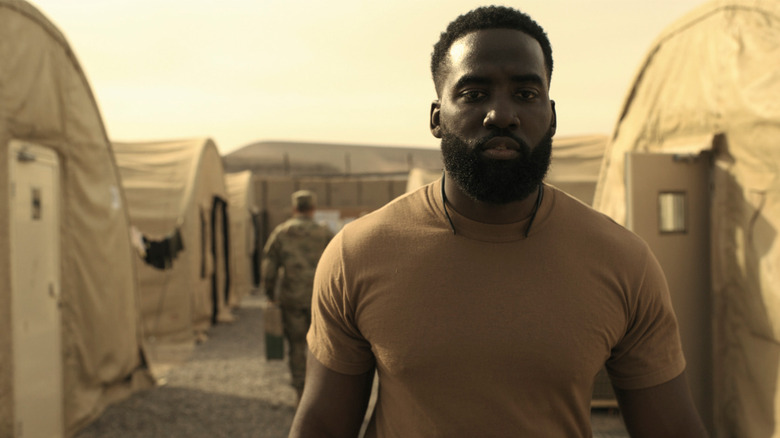The 15 Apple TV+ Shows That Justify A Subscription
Since it launched in November 2019, Apple TV+ has racked up multiple Emmy Award wins for "Ted Lasso," and with "CODA," it became the first streaming service to win an Academy Award for Best Picture. However, there's a lot more to Apple's TV offerings than just "Ted Lasso," or even the ongoing sci-fi mystery of "Silo."
Unlike the big guns — Disney+, Max, Netflix, and Prime Video — Apple TV+ isn't a service that gives you access to an extensive library of old movies and TV shows. It does allow you to stream select "companion films to the newest Apple Originals," but these are just available "as a limited-time subscriber bonus."
It really puts the onus on those Apple Originals to live up to the monthly subscription price. In 2021, we looked at 10 Apple TV+ movies that justify a subscription, and since then, acquired films from A24 like Joel Coen's Oscar-nominated "The Tragedy of Macbeth" have made the service at least a necessary stop-and-start, if not an ongoing must-have. That will only continue as Martin Scorsese's upcoming "Killers of the Flower Moon" joins the growing Apple TV+ catalog.
Here, we'll dive into a corresponding list of 15 Apple TV+ shows that justify a subscription. This is just a starter pack — there are even more critically acclaimed shows like "Shrinking" and "Mythic Quest" that aren't covered here. While a comedy or two is included, the following list is weighted more toward hour-long dramas with a genre bent: thrillers, science fiction, and fantasy. If you're going to pay the $6.99 a month, you might as well get your money's worth and take the biggest possible bite of fruit from the Apple TV+ tree.
Ted Lasso
In the third season of "Ted Lasso," the bloom came off the rose, critically, as the show became more of a turgid dramedy, but there's no denying the first season's enduring comedy appeal. For anyone new to Apple TV+, "Ted Lasso" season 1 is a natural starting point, since it's easily been the streamer's most talked-about show. During the pandemic, the can-do "Lasso Way" had such a wide-reaching cultural impact that it had Hollywood looking to produce more uplifting content.
Even if sports aren't your thing, Jason Sudeikis may quickly win you over with his character's viral celebration dance and indefatigable Kansas kindness. (He was probably doing the same dance backstage on Emmy night). On the plane to England, where Ted is set to coach a Premier League football team — despite having a background in American football, not soccer — he offers homespun wisdom like: "Taking on a challenge is a lot like riding a horse, isn't it? If you're comfortable while you're doing it, you're probably doing it wrong."
Later, Ted asks one player, "You know what the happiest animal on earth is? It's a goldfish. You know why? It's got a 10-second memory. Be a goldfish."
The owner of Ted's team, Rebecca (Hannah Waddingham), has deliberately set him up for failure. When he takes the field, he hears the whole stadium chanting, "Wan***!" Even schoolchildren taunt him like that. Yet in the face of an uncaring and downright hostile world, Ted manages to remain cheerful. As journalist Trent Crimm (James Lance) observes, you "can't help but root for him."
"Ted Lasso" season 1 is the kind of show that can brighten a dark day or make you want to be a better person. It's a consistent delight and is guaranteed to put a smile on your face.
Silo
Though it hasn't gained quite as much buzz as "Ted Lasso," "Silo" may actually be the best Apple TV+ series yet. Based on Hugh Howey's "Wool" book series, which became a runaway bestseller after he self-published it through Amazon's Kindle Direct, the series is set in a dystopian future where 10,000 people live throughout 144 floors underground in an enormous silo. Walking the spiral staircase up or down through the silo becomes a full-on backpacking expedition.
From "Doctor Sleep" to the "Mission: Impossible" films, Rebecca Ferguson has proven herself a reliable — at times, magnetic — screen presence who is capable of holding her own against the biggest movie stars. In "Silo," Ferguson leads a first-rate ensemble that includes familiar faces like Tim Robbins, Common, Rashida Jones, David Oyelowo, Geraldine James, Will Patton, and Iain Glenn.
Just don't get too comfortable with any one character, because "Silo" soon emerges as a mystery underpinned by "a long list of people who have died recently under questionable circumstances." For some reason, most relics from the pre-silo civilization are illegal, and if you say you want to go outside, to "the world beyond the silo," you will get your wish (though you may wish you had not).
The mystery element of "Silo" keeps it compulsively watchable, but the series also taps into questions larger than "Who's the murderer?" as it pulls back the curtain on who controls the truth, and what happens when our beliefs are founded on a lie.
As Robbins says in the trailer for "Silo," "Some mysteries, they're best left unsolved." With the show's 10-episode first season currently underway (it's set to wrap up on June 30, 2023), "Silo" gives new viewers a chance to get in on the ground floor ... or the silo's bottom level, as the case may be.
Foundation
Cloned emperors. Stormtrooper-like guards. Spaceships firing on planets, and landspeeders moving across desolate terrains. No, it's not "Star Wars" — just one of the many things that inspired it.
"Foundation" season 1 is a 10-hour ride on a star bridge, full of world-building wonder. It's the first stately screen adaptation of Isaac Asimov's seemingly unfilmable science fiction book series, which began in the early 1950s. The show could have easily come out looking like a cheap Syfy series, but instead, it puts some real production value on display.
Jared Harris — so good leading the first season of AMC's "The Terror" — stars as Hari Seldon, a mathematician who predicts the fall of the Galactic Empire through "psychohistory." He wants to minimize the catastrophe and assemble an Encyclopedia Galactica, a foundation of human knowledge that will allow future generations to rebuild.
He runs into denialism, however, from Lee Pace's Brother Day, who is part of a genetic dynasty that presently includes two other versions of himself, one young and one old. Day wants to control the narrative and the news, and it doesn't take a rocket scientist or even a psychohistorian to recognize that there's a climate change allegory in here.
In 2021, Apple TV+ dropped the first two episodes of "Foundation" the same day, and not without good reason. The second episode ends on a major cliffhanger that recalls "Game of Thrones" at its most addictive and shocking. At least one actor who appeared on that show and "Star Trek: Deep Space Nine" is among the faces onscreen here.
Season 2 of "Foundation" is set to premiere on July 14, 2023, so as of this writing, newbies have plenty of time to get caught up on it. In the meantime, "Please respect and enjoy the peace."
Severance
In a year when Hollywood writers are on strike against exploitative working conditions, all while tech and media companies continue to lay off workers at an alarming rate, a series about a biotech company that exploits its workers to the point of controlling their memories seems more relevant than ever. The title "Severance" refers to a procedure that surgically splits a person's consciousness, separating memories of their work life from their home life.
For the employees of Lumon Industries, bringing their work home with them — in their heads — is no longer an option. That might sound desirable, but even for those who consent to the procedure to forget their painful experiences outside work, being severed isn't all it's cracked up to be. How would you like to have a chip inserted in your brain so your employer could activate an overtime contingency at any time?
Inspired by everything from "The Matrix" to "Office Space," "Severance" became almost as big an Emmy darling as "Ted Lasso," racking up over a dozen nominations. Adam Scott stars as Mark S., who gets promoted to the head of MDR — microdata refinement, a seemingly meaningless task — after his colleague Petey (Yul Vazquez) goes the mysterious way of, "Here one day, gone the next."
Lumon Industries may have a wellness counselor on staff, but it's the face of capitalism run amok: an inhumane corporate overlord that cares nothing about the true well-being of its disposable human lab rats. Let "Star Wars" create fake backgrounds with Volume technology; "Severance" is content to have Mark, the appropriately named Helly (Britt Lower), and their fellow "Innies," Irving (John Turturro) and Dylan (Zach Cherry), get lost in a maze of practical hallways using old-school "Star Trek" tricks. You know you're in good hands when the production designer references "Alien."
Black Bird
Taron Egerton's Apple TV+ credits aren't limited to TV; he also starred in "Tetris," one of many movies this year to almost manufacture its entire plot out of product placement. Our review of "Tetris" calls it "as thrilling as the game itself," while Looper argues that it and other 2023 films like "Air," "Blackberry," and "Flamin' Hot" (about the Cheetos brand, of all things) are a sign of corporate America valuing middlemen in business suits over artists and creators.
If you'd rather see Egerton in a prison jumpsuit, "Black Bird" has got you covered. No sooner is his character, Jimmy Keene, jailed for his ill-gotten gains than he finds himself presented with an offer that could commute his sentence. All Jimmy has to do is buddy up with Larry Hall, a convicted rapist and serial killer, long enough to gather information that will ensure Hall stays in prison.
Paul Walter Hauser ("Richard Jewell") won a Golden Globe for his performance as Hall, which sees him affecting a creepy, high-pitched voice. "Black Bird" was developed by Dennis Lehane, who knows a thing or two about crime stories, having written novels like "Shutter Island," "Mystic River," and "Gone Baby Gone," all of which have been adapted to film. Lehane has also written for shows like "The Wire," but in "Black Bird," he's bringing another author's work to the screen.
That author is the real James Keene, whose autobiography, "In With the Devil: A Fallen Hero, a Serial Killer, and a Dangerous Bargain for Redemption," co-written by Hillel Levin, is the source material for "Black Bird." This eight-episode miniseries also holds the distinction of being the final TV credit in the late Ray Liotta's filmography. It was a posthumous release that came just a few weeks after Liotta died in 2022.
Shining Girls
"Shining Girls," like the British sitcom "Derry Girls," might sound like a show about a Stephen King fan club, but it has nothing to do with him. In fact, as far as Apple TV+ options go, we'd recommend this eight-episode series over the tiresome King-scripted adaptation of "Lisey's Story" any day of the week.
"Shining Girls" does adapt a sci-fi thriller novel by Lauren Beukes, but instead of taking you to a place called Boo'ya Moon, it will set you down in Chicago, where Kirby Mazrachi (Elisabeth Moss) works as an archivist for the Sun-Times newspaper. The thing is, Kirby's reality is constantly shifting. Her hair color, her home life, and other details keep changing, leaving her in a "Memento"-like predicament where she has to take notes just to keep track of her own identity.
It's a scenario that doesn't exactly lend itself to other people believing Kirby, any more than they were ready to believe Moss's character in "The Invisible Man." Years ago, Kirby was assaulted by another invisible man of sorts — one who can't be sketched for others to recognize since no one knows him. He left Kirby with a distinct "cutline," as the title of the first episode calls it, and when another woman's body turns up with the same cut pattern, Kirby teams with local reporter Dan Velazquez (Wagner Moura) to solve what could be a string of related murders going back decades.
In the background lurks Harper Curtis (a chilling Jamie Bell), who doesn't seem to age. You can probably guess where this is going. "Shining Girls" keeps the audience on its toes, however, and as our 2022 review notes, it has enough twists and turns that patient viewers might find themselves "rewarded with an addictive new series."
Losing Alice
Ayelet Zurer is, like fellow Israeli actress, Gal Gadot (AKA Wonder Woman), perhaps best known to American audiences for her role in a shared superhero universe: two of them, actually. In "Man of Steel," Zurer played Superman's Kryptonian mother, Lara, and in Netflix's "Daredevil" series, she played the Kingpin's wife, Vanessa.
The demands of playing wife and mother also actively constrain her character's creativity in "Losing Alice," which otherwise liberates Zurer from DC and Marvel and the confines of the supporting cast. In this eight-episode, Hebrew-language psychological thriller, she strikes out on her own as Alice Ginor, a film director whose best work is seemingly behind her. She's married to a prominent actor, David (Gal Toren), whose career now comes at the expense of her own.
On a train straight out of a Hitchcock film, Alice meets an alluring young stranger named Sophie (Lihi Kornowski), a screenwriter who professes to be a fan of her work. Sophie soon inveigles herself into Alice and David's life, becoming a kind of dark muse for Alice and reawakening the dormant artist in her. Yet the more Alice learns about Sophie and her past, the more suspicious she becomes.
Blurring the lines between art and life, "Losing Alice" plays with the femme fatale trope and other thriller conventions to tell a story about people using each other and the lengths to which they will go to fulfill their creative ambition, even if it means sacrificing those they love.
The Mosquito Coast
Harrison Ford once called "The Mosquito Coast" his best film role. Based on the same novel, Apple's streaming series enlists author Paul Theroux's nephew, Justin Theroux, to take over from Ford. (His "Leftovers" costar, Paterson Joseph, also shows up.)
Allie Fox is a wild-eyed inventor who watches the mail for patent office envelopes, only to receive foreclosure notices. When not devising get-rich-quick schemes, he drives his pickup truck across expanses of farmland outside a town full of weathered retail and chain restaurant signs. Plastic bottles pile up in his boss's trash can, while on his front porch, his son listens to radio voices rant about global warming being a hoax.
It turns out Allie has been reinventing himself: he and his wife, Margot (Melissa George), are on the run and have burned through six identities over nine years. They can always start again, even if it means scouring the dump for discarded computer parts. "There's gold in them thar hills," Allie says, but in this case, it's garbage hills with culture vultures circling overhead.
"The Mosquito Coast" isn't just here to relay environmental concerns. It wants to interrogate the American dream, and the Foxes and their triumphalism are bound up in that. As they enact their own Southwest "Ozark," we see them MacGyvering and outmaneuvering or just plain screwing over everyone in their path. There's a hitman who looks like Heisenberg from "Breaking Bad," and instead of Han and Chewie, there's Juan and Chuy, two coyotes who help smuggle the family across the Mexican border.
Chuy tells Allie, "You are America, ***hole. And you'll never get away from that." Straight shot, brother. Though "The Mosquito Coast" was canceled in 2023, its second season already ends on what could be considered a note of finality for the series.
Servant
On January 20, 2020, the day before the first confirmed Covid case in the U.S., we spoiler-reviewed the first season of "Servant" and talked about how it fits into M. Night Shyamalan's filmography. That review touched on Shyamalan's love for contained settings. At the time, one criticism going around about "Servant" was how it conspired, sometimes awkwardly, to keep its characters stuck indoors, with the outside world only being seen through video screens.
There's also a plot point where one of the show's main characters, a stay-at-home chef named Sean Turner (Toby Kebbell), loses his sense of taste. As the coronavirus spread, of course, some people would lose their sense of taste in real life, and many of us would find ourselves sequestered in our homes in a "Servant"-like fashion, relying more and more on video links to the world outside.
How many of us would nurture our spouse's delusions that an inanimate reborn doll was their baby? How many of us would manhandle that doll and invite a mysterious nanny into our houses to take care of it?
Not very many, probably, but that's the route that "Servant" goes. Nell Tiger Free ("Game of Thrones") plays the nanny, Leanne Grayson, and Lauren Ambrose ("Six Feet Under") plays the mother, Dorothy Turner, a local TV reporter. Rupert Grint, all grown up since his "Harry Potter" days, plays her brother, Julian Pearce, who always has a glass of red wine in hand.
The characters in "Servant" don't always act consistently. It can be hard to parse their motivations and frustrating to watch their lack of communication. But if we're being honest, this was the first show intriguing enough to justify an Apple TV+ sign-up.
Dr. Brain
"You are talking about hacking into brains?!" someone says incredulously in "Dr. Brain."
Why, yes, we are. It's better than hacking up brains or other body parts, which is what Kim Jee-woon showed gorehounds in his grisly 2010 serial killer thriller, "I Saw the Devil." "Dr. Brain" sees Kim going into TV mode, directing and co-writing all six episodes of season 1.
This was Apple's first Korean-language series. In contrast with the period drama of "Pachinko," Dr. Brain's cat-like reflexes tip more into the kind of genre fare that helped put Korean cinema on the map internationally in the leadup to the 92nd Academy Awards, where "Parasite" won big. Lee Sun-kyun, who costarred as the wealthy father in "Parasite," takes the lead in "Dr. Brain" as neuroscientist Sewon Koh, who witnessed his mother walk out in traffic when he was a boy, but showed no outward emotion after her death.
Sewon is on the autism spectrum, but as an adult, he's devised a new technology that allows him to access the memories of others through brainwave synchronization. (Roger Ebert might have called it an empathy machine.) One guinea pig for this technology is a fresh corpse at the morgue, making it seem like it could help Sewon solve murders and find his missing son. If only it didn't come with the side effect of scrambling his brain with dead people's memories...
You might need to adjust the language settings for "Dr. Brain" yourself, as it's been known to default to an English dub despite promising onscreen that it will be "presented in its original language." If you can get past such annoyances and sync your brain with it, though, "Dr. Brain" might provide some twisty diversion and a bit of diversity to keep your binge from being an #AppleSoWhite.
Calls
Five minutes into the first episode of "Calls," someone phones the police. They're on the horn with a 911 dispatcher, and it feels appropriate because the show puts the viewer in a similar position. "Calls" engages the ears more than the eyes, holing you up in the dispatcher's console, letting you listen in on calls from both coasts as an "Invasion of the Body Snatchers"-like scenario seems to play out in New York and L.A.
That's just the first episode. The series begins with "The End," which quickly ratchets up the tension, and continues with "The Beginning," which winds back the clock and shifts to a different city and story, where a man driving away from his pregnant wife's house gets caught in a time-warp.
Episodes are only fifteen or twenty minutes long so that the total series running time is about the length of a movie. Each ep features a new star-studded voice cast. Pedro Pascal is an example of one actor whose voice is instantly recognizable, if only because we're so used to hearing it through Mando's helmet on "The Mandalorian."
Along the way, there are bank robberies, love triangles, and calls from the past and future. It soon becomes apparent that something is happening to the cell phone waves, making it possible for characters to talk between different moments in time.
Fede Álvarez, the director of "Don't Breathe" and the 2013 "Evil Dead" remake, developed this anthology based on the French series of the same name. It's not quite a podcast; the screensaver-like visuals do serve to heighten the mood at times. However, as you listen and read the subtitles, "Calls" asks you to see things in your mind's eye.
See
After watching "Calls," being able to hear the characters but not see them, you might be better able to identify with the characters in "See," most of whom have no sense of sight. I came into season 2 of "See" having not watched season 1. That might seem counter-intuitive, but I was mostly just curious to witness Jason Momoa and Dave Bautista battle it out as blind, bearded brothers in a post-apocalyptic landscape.
They're in "Dune" together and have teased a future buddy cop movie, but here, they've got a real grudge match going. Momoa plays Baba Voss — his name is always said in full like that — and Bautista plays the scar-headed Commander General Edo Voss, who uses that full imperious title to introduce himself.
They trek across a snowy landscape where people finger-read identification knots and jingle, cluck, or tap sound wands to communicate their location non-verbally. Baba Voss has an eccentric, hunched way of walking, almost as if he's knuckle-dragging, but he's still adept at hacking off limbs. "You can't see a kill," he tells his son. "You have to feel it ... the ripping and the tearing."
Sylvia Hoeks, who gave a standout performance as the replicant antagonist in "Blade Runner 2049," is dialed up to 11 here as a murderous queen with a sing-song voice. Alfre Woodard dons a grey dreadlock wig like Ezekiel in "The Walking Dead," and if any of this sounds ripe or half-baked, well, that's just the mythology. "See" sets you down in a strange new world and asks you to keep up and not judge it too harshly.
Dickinson
Hailee Steinfeld made her feature-film debut in the Coen Brothers' "True Grit," which earned her an Oscar nomination at the age of 15. Compared to the poet Emily Dickinson, whose genius went largely unrecognized throughout her lifetime, Steinfeld was an overnight success.
In "Dickinson," she's at the center of an anachronistic teen comedy with a hip-hop sensibility. It's the type of show that will have Emily say "nailed it" when she writes a good 4 a.m. poem, or that will have her huff, "This is such b******t," when her mother (Jane Krakowski) assigns her menial 19th-century chores.
Mom is concerned that Emily doesn't know how to behave like a proper young lady. "I was married at 18," she says, "It's high time for you to get a husband." And, "You're going to make a good housewife one day, Emily Dickinson." She's trying to marry Emily off to gentlemen suitors, but as far as Emily is concerned, she has but "one purpose on Earth, and that is to become a great writer."
The plucky heroine of "Dickinson" is also in love with her best friend, who's betrothed to her brother, and she's in love with Death, who happens to be played by the rapper Wiz Khalifa. Death takes her out for a ride every night on a carriage drawn by billowing white ghost horses.
"Dickinson" follows the three-seasons-and-done model of so many other streaming shows on Apple TV+ and elsewhere (which may, unfortunately, have roots in a cost-cutting measure to bilk modern Emilys and other hard-working writers out of residuals). Steinfeld, however, wasted no time in rebounding after "Dickinson" ended, going from season 3 of it to season 1 of Marvel's "Hawkeye" the same month.
For All Mankind
Part of the original lineup of shows on offer when TV+ debuted, "For All Mankind" showcases an alternate history where the U.S. lost the space race and Russian cosmonauts were instead the first to land on the moon. You know you're not in Kansas anymore when they dedicate the moon landing to "the Marxist-Leninist way of life."
"For All Mankind" hails from Ronald D. Moore, the creator of "Outlander" and the reimagined "Battlestar Galactica." Joel Kinnaman brings a brooding presence to the role of Edwin Baldwin, an astronaut who gets demoted to a desk job when he runs his mouth to a reporter at a bar, where good old boys pin a newspaper with the headline "Red Moon" to the dartboard.
The official logline of "For All Mankind" bills it as a series that "presents an aspirational world where NASA and the space program remained a priority and a focal point of our hopes and dreams." Season 1 accompanied the 50th anniversary of the Apollo 11 mission in 2019. It recreates that event but with added suspense since the story is on a different trajectory, and we no longer know what will happen.
Season 2, which premiered in 2021 and currently boasts a 100% Fresh rating on Rotten Tomatoes, jumps forward in time to the 1980s. NASA is now militarized and the space race has ramped up to become a full-on cold war on the moon, with astronauts carrying guns.
The U.S. military established its own real-life Space Force in December 2019, the month after "For All Mankind" premiered. Now, we have billionaires like Elon Musk, Richard Branson, and Jeff Bezos locked in a space race. Who's to say the future won't come to resemble this alternate history?
Invasion
Speaking of NASA, "For All Mankind" isn't the only Apple TV+ series that will take you into said space agency's control room. The trailer for "Invasion" ends with the words "Hold onto your humanity," but the sight of Sam Neill and the overall vibe of the thing might have you thinking of that "Jurassic Park" quote, "Hold onto your butts."
Crop circles form, locusts swarm, kids spout nosebleeds, and mothers steal cars as an alien invasion unfolds across Earth. If that sounds exciting, just know that "Invasion" is a very slow burn. What happens when you take a bunch of characters who have every reason to feel alone in the world, and insert them in the middle of an extraterrestrial attack that proves humankind isn't alone in the universe?
The answer: melodrama. "Invasion" takes a "Babel"-like, cross-continental approach to its mostly offscreen alien invasion, showing the perspective of people in places like Tokyo and Afghanistan. Shamier Anderson ("John Wick: Chapter 4") plays a U.S. soldier, while Rinko Kikuchi, who did co-star in "Babel," appears as an astronaut. She's joined by Shiori Kutsuna, who made an impression as the effervescent Yukio in "Deadpool 2." That movie was co-produced by Simon Kinberg, who serves as co-creator here with David Weil, the showrunner behind Prime Video's "Hunters."
Prime Video is just one of the many competitors that Apple faces in the never-ending streaming wars. Apple TV+ is cheaper than Netflix or other services, however, and as of yet, it hasn't followed their lead and pivoted to an ad-supported tier, while jacking up the price for subscribers who want to go ad-free. Anyone looking for a slightly less trashy streaming alternative should find that Apple TV+ has developed enough quality shows in its first few years to at least warrant a trial subscription.
